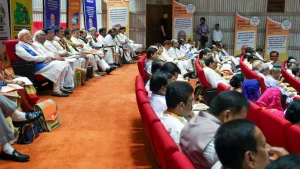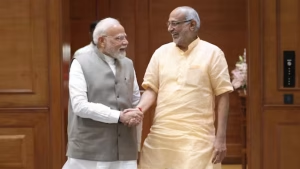New Delhi – Prime Minister Narendra Modi will cast the first vote on Tuesday, September 9, 2025, in the highly anticipated vice-presidential election. This significant electoral process comes after the post fell vacant during the monsoon session of Parliament when Vice-President Jagdeep Dhankhar resigned on July 21, citing health concerns.
The vice-presidential elections has drawn considerable attention as it represents a crucial political moment for both the ruling National Democratic Alliance (NDA) and the Opposition. Union Ministers Kiren Rijiju and Ram Mohan Naidu, along with Shiv Sena MP Shrikant Shinde, have been appointed as election agents to oversee the electoral proceedings.
Key Candidates in the Vice-Presidential Election

The elections presents voters with two distinct choices representing different political ideologies. The NDA has nominated Maharashtra Governor C.P. Radhakrishnan as their candidate, bringing his extensive administrative experience to the forefront. Meanwhile, the Opposition has fielded Justice (retired) B. Sudershan Reddy, leveraging his judicial background and legal expertise.
This vice-presidential election follows the constitutional process where members of both Houses of Parliament serve as electors. The outcome will significantly impact the political landscape and the functioning of the Rajya Sabha, where the Vice-President serves as the ex-officio Chairman.
Comprehensive Preparation for Electoral Process


Two days before the vice-presidential election, both the NDA and Opposition initiated extensive preparations to train their Members of Parliament on the voting procedures. The ruling party organized a comprehensive two-day workshop called “Sansad Karyashala,” which commenced on Sunday, September 7, 2025.
This workshop served multiple purposes beyond preparing for the vice-presidential election. Prime Minister Modi, his Cabinet colleagues from the BJP, and party MPs participated actively in the sessions. The workshop also passed a significant resolution expressing gratitude to Modi for implementing transformative Goods and Services Tax reforms.
Strategic Political Messaging During Vice-Presidential Election Campaign

At a crucial meeting of NDA MPs on Monday, September 8, 2025, Prime Minister Modi outlined an ambitious action plan extending beyond the vice-presidential election. He emphasized the importance of spreading public awareness about GST reform benefits, demonstrating how the vice-presidential election period serves as a platform for broader policy discussions.
Modi suggested that MPs organize trader conferences in their respective constituencies to educate the business community about GST regime simplifications. This strategy connects the vice-presidential election momentum with grassroots economic awareness campaigns.
Promoting Self-Reliance During Festival Season
The Prime Minister’s vision extends beyond the immediate vice-presidential election concerns to encompass long-term economic objectives. He encouraged MPs to organize “Swadeshi Melas” during the upcoming Navaratri and Deepavali festivals, promoting domestically manufactured goods as essential for achieving national self-reliance.
This initiative demonstrates how the vice-presidential election period becomes a catalyst for broader policy implementation. Modi emphasized that exhibitions supporting Indian products, local artisans, and micro/small industries should be held in each parliamentary constituency.
Revolutionary GST Reforms and Their Impact
During the vice-presidential election preparations, Modi characterized the GST reforms as revolutionary, stating they would benefit all sections of society and various economic sectors. This positioning of policy achievements during the electoral period shows the interconnected nature of political processes and governance initiatives.
Also Read: Latest Bihar Seat-Sharing Talks Intensify as Nitish Kumar Names 1st Candidate
The comprehensive approach to the vice-presidential election reflects the government’s strategy of utilizing significant political moments to reinforce policy messages and strengthen public support for major economic reforms.
Electoral Significance and Democratic Process
The vice-presidential election represents more than a constitutional requirement; it embodies the democratic principles that guide India’s parliamentary system. The competitive nature of this election, with strong candidates from both sides, ensures robust democratic participation and meaningful choice for the electorate.
As the vice-presidential election unfolds, it will demonstrate the strength of India’s democratic institutions and the peaceful transfer of responsibilities within the constitutional framework. The process highlights the importance of collective decision-making in selecting key constitutional positions.
Final Statement
The vice-presidential election scheduled for September 9, 2025, marks a significant moment in Indian politics. With Prime Minister Modi casting the first vote and strong candidates representing different political philosophies, this election will shape the country’s constitutional leadership while serving as a platform for broader policy discussions and democratic engagement.

